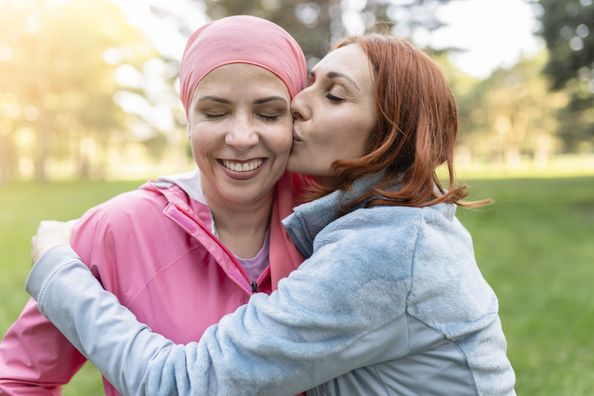With 1 in 8 women developing breast cancer at some point in their life, breast cancer is the most common form of cancer in women in the US other than skin cancer. But despite how common it is, it affects each woman differently.
One significant factor in how breast cancer affects a woman is her age and whether or not she has reached menopause — the time in her life where her menstrual periods have ended.
Breast cancer is most often diagnosed in middle-aged and older women, with the median age being around 63. While rare, it’s possible for women younger than 45 to be diagnosed with it. Since the transition into menopause typically begins in a woman’s mid-to-late 40s, and the average age of menopause is 52, this means that younger women with breast cancer most likely have not gone through menopause yet.
Being pre- or postmenopausal can shape a woman’s entire experience with breast cancer. Here are some of the differences women may notice based on their age and when in their life they are diagnosed with breast cancer:
The Stage of the Cancer When Diagnosed
Women who are diagnosed at a younger age are more likely to have cancer that is at a later stage when it is more difficult to treat. Among women over age 65 who are diagnosed with breast cancer, 68% have cancer in only the breast (meaning it hasn’t spread throughout the body). But that percentage drops to only 47% among women ages 15 to 39.
The Type of Breast Cancer
There are several types of breast cancer, and some are more common at certain ages.
Often, breast cancer cells contain proteins called “receptors” that attach to the hormones estrogen or progesterone, and allow the cancer to grow.

Around 80% of breast cancers in postmenopausal women are driven by estrogen.
Premenopausal women are more likely to have estrogen receptor-negative cancer and triple-negative cancer. The cells in these types of cancer do not have estrogen receptors, so their growth isn’t related to estrogen.
So, why does estrogen play a larger role in breast cancers after menopause?
Most estrogen that a woman produces comes from her ovaries, but that production stops after menopause. By the time a woman has stopped menstruating, she has likely been exposed to more estrogen than a younger woman who has not been menstruating for as long — and excessive or long-term exposure to estrogen has been linked to an increased risk for breast cancer.
This exposure is also a reason why women who got their first period early (before age 12), or go through menopause after age 55, have a higher likelihood of developing breast cancer.
If you have any concerns about breast cancer, the providers at Duly Health and Care are here for you. Schedule an appointment with your primary care provider or OBGYN to discuss your risks for breast cancer.
Risk Factors for Breast Cancer
In women who have gone through menopause, one of the biggest risk factors is taking menopausal hormone therapy — a form of therapy used to treat symptoms like hot flashes and vaginal dryness. The therapy may involve taking estrogen alone or taking estrogen combined with progestin (a synthetic hormone that mimics the effects of progesterone). The combination treatment has been linked to an increased risk of breast cancer.
In premenopausal women, it’s less about hormones. The risk factors are a little different. They include:
- A personal history of breast cancer or other breast problems, like atypical ductal hyperplasia
- A family history of close relatives with breast cancer diagnosed before age 45
- Mutations (changes) in the breast cancer genes BRCA1 and BRCA2
- Dense breasts
Also read, “Common Questions About Breast Cancer Screening & Risk Factors”
The Relationship Between Weight, Breast Cancer, and Menopause
Being overweight after menopause can increase the risk of breast cancer. After menopause, most of your estrogen comes from fat tissue — and the more fat tissue you have, the more estrogen you may be exposed to.
Here’s where it gets a little complicated: The risk for breast cancer is actually slightly lower in women who were overweight before menopause. However, don’t reach for the cookies and pizza just yet. Being overweight comes with plenty of other health risks, like heart disease or type 2 diabetes.
Treating Breast Cancer
The type of treatment often depends more on the stage of the cancer. Most women with breast cancer in stages I, II, and III are treated with surgery. Many then go on to receive radiation and medication.
Still, age can play a role, especially when it comes to hormone therapy.
Women who have gone through menopause may be prescribed:
- Selective estrogen receptor modulators (SERMs), which stop estrogen from connecting to cancer cells
- Selective estrogen receptor degraders (SERDs), which bind tightly to estrogen receptors and break them down
- Aromatase inhibitors (AIs), which stop the body from producing most of its estrogen
Women who are premenopausal may be prescribed:
- SERMs
- Ovarian suppression, which removes or shuts down the ovaries — the main source of estrogen
- SERDs or AIs, but only if also paired with ovarian suppression
In addition, premenopausal women often undergo fertility preservation (removing and saving their eggs so they can get pregnant in the future) before treatment. Certain breast cancer treatments, like chemotherapy, can damage a woman’s ovaries and cause temporary infertility or difficulty getting pregnant after treatment. Other treatments involve removing the ovaries entirely, which makes a woman postmenopausal and causes permanent infertility.
Also read, “The Care Team Who Supports Your Breast Cancer Treatment”
At any age, and no matter the stage of the cancer, it’s overwhelming to be met with a cancer diagnosis. There is a long road ahead of you — but with a team of providers who have your back the entire way, it isn’t a road you will walk alone.
Health Topics:








